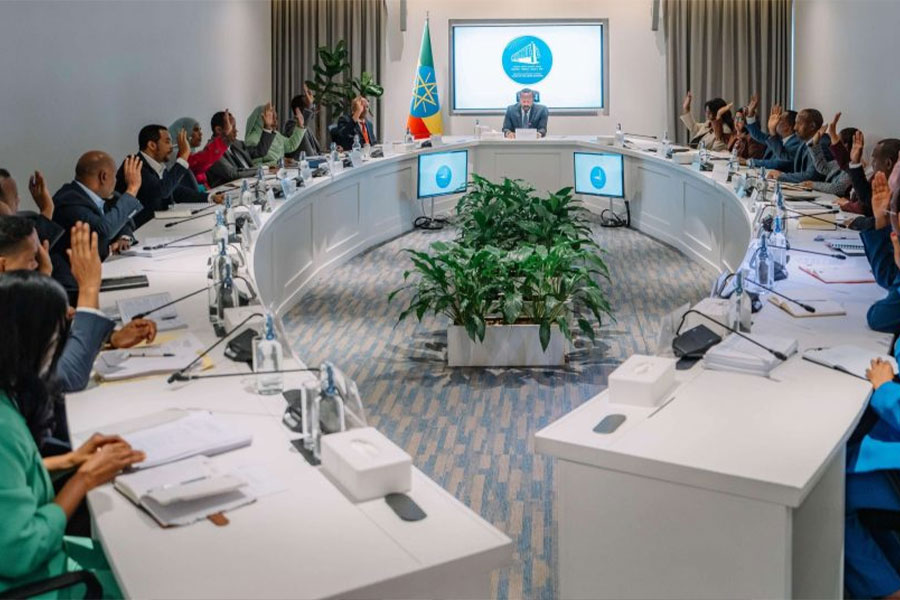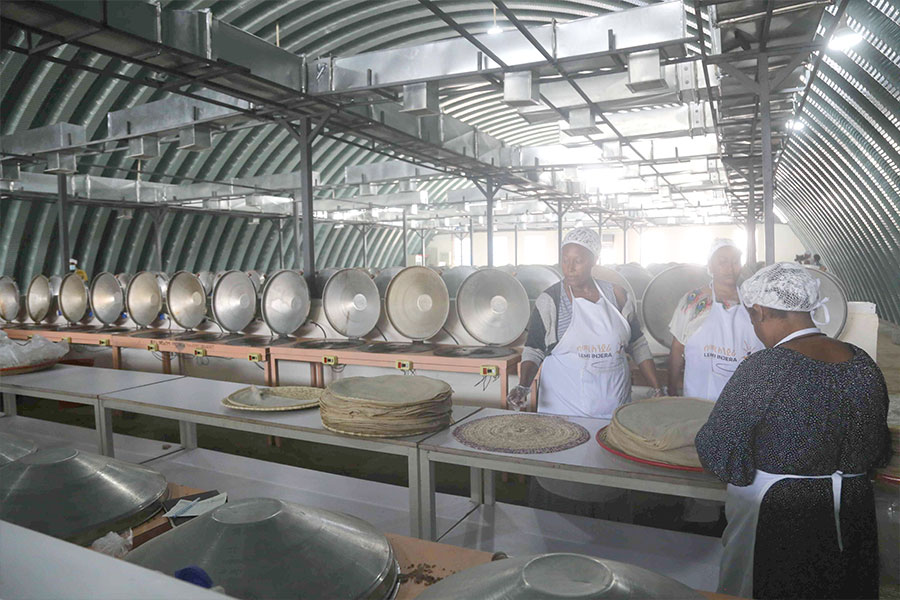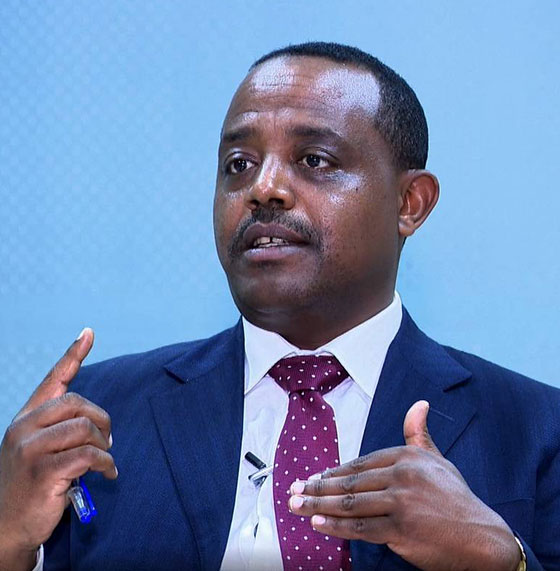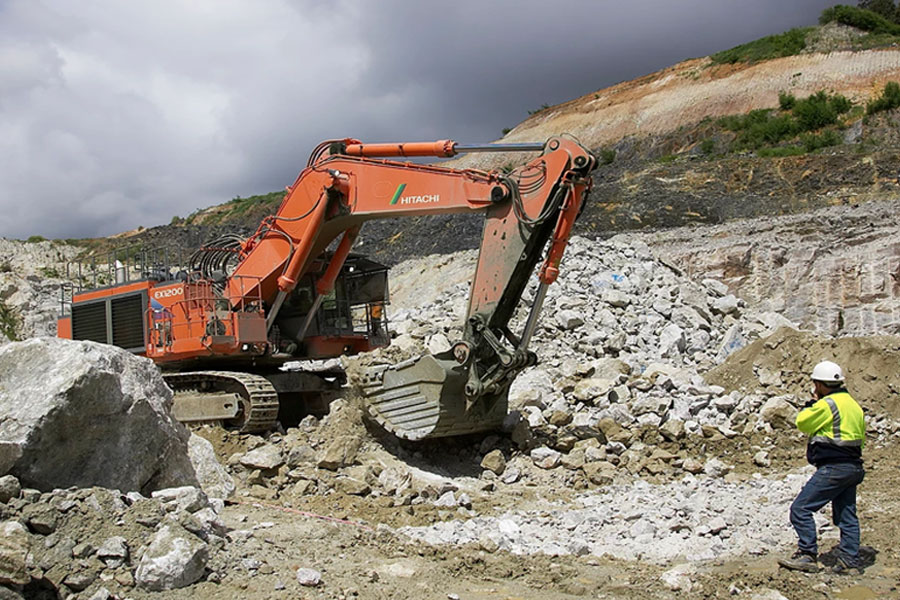
Radar | May 06,2025
Underground Traffic Management Center
The smart traffic management centre around the Megenagna area is under construction with a one billion Birr budget financed from the World Bank. Built by the Chinese contractor China Communications Construction Company (CCCC), the centre is expected to have four underground floors set to oversee traffic mobility across 98 intersections. The centre has been championed as a pivotal step in modernising the capital's traffic flow, with software equipment sourced from electronics multinational corporation Hisense. It sits adjacent to the 20-floor headquarters for the Addis Abeba Transport Bureau also slated for completion in the coming year. While the structural construction of the project is completed, it has yet to install computers and essential technologies before providing services. The head of the Addis Abeba Transport Bureau, Mitiku Asmare, expects the project to significantly cut down on traffic congestion as traffic lights will be imbued with the capacity to moderate flow after accounting for a number of vehicles on the road.
Three Agricultural Market Centres
A trifecta market centres built for a whopping 6.8 billion Br are located along entrances to the city around Bethel, Laphto and Summit areas on a sprawling total of 8.8hct of land. Contracted to the Ovid Construction company headed by Yonas Tadele, the construction of the projects has transpired in less than a year. The Company's exponential growth in the past decade compounded by its use of aluminium formwork technology which significantly cuts back construction timelines is not observed in the market centres. The projects are being consulted by Biybone Consulting Engineers & Architects Plc, with the largest of the three sitting Lemi Kura sits on 3.88hct on two plots. The company is also building 60,000 residences in the capital in a public-private partnership with the city administration within a three-year schedule. Officials expect the markets to serve as an alternative to 'Merkato' by providing a convenient one-stop shop for the culinary needs of urbanites. The sale of agricultural produce in the capital traditionally takes place in open markets referred to as "Gulit", with large-scale projects to house these produce being relatively novel introductions.
Adwa Zero KM Museum
A 45,000sqm spectacle museum in commemoration of Ethiopia's historic battle and successful defence of its borders against invading Italians 127 years ago is slated for completion within three months near Emperor Menlik II's statue around the Piassa area. The 4.6 billion Br project, given special attention by both the City Administration and the Prime Minister, is made of 11 blocks that have auditoriums that can house 4,000 people at a time, galleries, gyms and art installations. A connecting bridge to the Mayor's office located across the street has already been built. Officials at the city administration suggest that the project is 87pc complete with finishing materials already purchased and being custom fitted by the 600 Ethiopian and 150 Chinese employees. The contractor is China Jiangsu International ETCG while consultancy services are provided by Ethiopia Construction Design Supervision Works Corporation (ECDSWC).
Addis-Africa International Convention & Exhibition Centre (AAICEC)
A gargantuan project that sits on a staggering 110,000 sqm aiming to become the continent's largest convention centre has finished 85pc of the construction process. The decade-long dream child of the Addis Abeba Chamber of Commerce & Sectoral Associations (AACCSA) is the concerted effort of several stakeholders. The City Administration is by far the largest shareholder with shares valued at over 500 million Br followed by the Ethiopian Tourist & Trading Enterprise’s (ETTE) 170 million Br and the Commercial Bank of Ethiopia (CBE) at 150 million Br. A 2013 public offering of 300,000 shares was subsequently accompanied by a capital raise to 1.5 billion Br. Having survived raised eyebrows and the change of guard across four mayors, the ambitious project has kicked up in gear under the helm of Mayor Adanech Abiebie over the past two years. The project's first phase will be opened by October according to Gashaw Abate, a supervisor at the project since its inception a decade ago. Once done, the AAICEC will house a 5,500sqm event hall, a commercial building with 35 shops and a bank, a 160-seater bridge restaurant, and a 1,500-seater amphitheatre. Designed by Universal Consulate and BET & Fasil Giorghis Consulting Architects, the Centre is expected to house 20,600 sqm of indoor space within its 110,000sqm area.
Tetrad Of Mega Road Projects
The road projects stretching over 21Km in the capital rolled out from Imperial, Qaliti, Bole Michael and Lebu are major constructions which entail connection bridges tens of meters in the air. The 10Km road project Qaliti -Tulu Dimtu has been dragged along following the cessation of financing by the Chinese Exim Bank. The mantle was taken by the City Administration and the capital Road Authority headed by Moges Tibebu at the start of the year with a budget of 267 million Br. Residents of the Tulu Dimtu condominium complex which sits a few yards past an interconnecting bridge 50 meters wide, will benefit the most from the project nearing completion. Moges has remarked that Addis Abeba will need half a trillion Birr over the next decade to meet its road infrastructure needs. The Bole Mikael road, estimated to cost close to 900 million Br should be able to accommodate 50,000 cars daily across 5.5Km bridge set to ease traffic congestion en route from Saris to Bole by providing an alternative path.
Addis Abeba Livestock Development & Excellency Center
A grand endeavour by the City Administration sits on 140,000sqm enormous compound in the Lemi Kura District around the Koye Fiche Condominium. Built at a cost of 1.1 billion Br to house farmers displaced due to development projects in the capital, the project combined husbandry, poultry and dairy production. With close to 70 sheds given rent-free to farmers and 30 sheds given to vendors who receive their produce from the compound, it has become a preferred shopping destination for residents in the area. Fresh eggs, milk and yoghurt are sold at the gates of the compound, with people queuing up to buy as early as dawn. Prices for the fresh produce cost an average of 20pc less than commonly found in markets across the capital with close to 500 farmers from 97 cooperatives working as it nears a full-fledged operation.
Lemi Injera Factory

The Lemi Injera centre located in the eponymous district is set to process 60qtl of teff a day and produce 408,000 pieces a day at full capacity with a cooperative effort by Ovid (170 million Br), MIDROC (75 million Br), Ethiopian Insurance Corporation (EIC) (20 million Br) and Metasebia Tadesse Construction (ovens). Administrators at the facility expect to earn around three billion Br annually through the four factories in the compound. All the equipment in the compound is made by local cooperatives while the teff is sourced from Bechu in Oromia Regional State. The 200 shops that surround the compound sell Injera at 15 Br a piece which is five Birr less than the general market price in the capital. The mixers can process 30Kg of teff every six minutes for a mixture of around 180ltr. The upsurge in conflict in Amhara Regional State has pushed the price of a quintal of teff being sold in the capital between 20-30pc.
PUBLISHED ON
Sep 10,2023 [ VOL
24 , NO
1219]

Radar | May 06,2025

Fortune News | Jan 25,2020

Radar | Oct 09,2021

Radar | Jul 31,2021

Fortune News | Jun 19,2021

Dec 22 , 2024 . By TIZITA SHEWAFERAW
Charged with transforming colossal state-owned enterprises into modern and competitiv...

Aug 18 , 2024 . By AKSAH ITALO
Although predictable Yonas Zerihun's job in the ride-hailing service is not immune to...

Jul 28 , 2024 . By TIZITA SHEWAFERAW
Unhabitual, perhaps too many, Samuel Gebreyohannes, 38, used to occasionally enjoy a couple of beers at breakfast. However, he recently swit...

Jul 13 , 2024 . By AKSAH ITALO
Investors who rely on tractors, trucks, and field vehicles for commuting, transporting commodities, and f...

Oct 25 , 2025
The regulatory machinery is on overdrive. In only two years, no fewer than 35 new pro...

Oct 18 , 2025
The political establishment, notably the ruling party and its top brass, has become p...

Oct 11 , 2025
Ladislas Farago, a roving Associated Press (AP) correspondent, arrived in Ethiopia in...

Oct 4 , 2025
Eyob Tekalegn (PhD) had been in the Governor's chair for only weeks when, on Septembe...